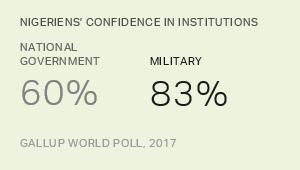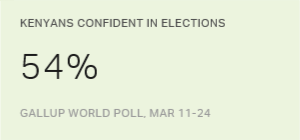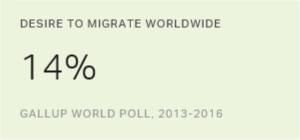Story Highlights
- Majorities confident in Niger's national government, military
- Perceptions of safety high, despite decline from 2015
- 49% of Nigeriens approve of President Mahamadou Issoufou
WASHINGTON, D.C. -- Although the Oct. 4 attacks that killed U.S. and Nigerien soldiers have drawn new attention to U.S. military engagement in Africa, Niger has been dealing with militant groups within and near its borders for years. Amid Niger's efforts to combat groups linked to Boko Haram, al Qaeda and the Islamic State group, among others, Nigeriens' confidence in their national government and military remains high: Three in five express confidence in their national government, and more than four in five are confident in their military.
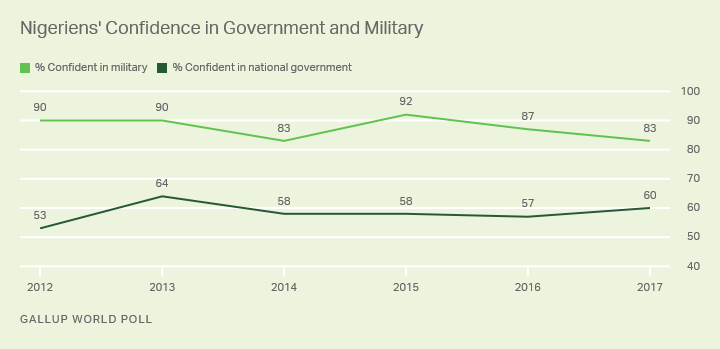
While Niger has been a counterterrorism partner of the U.S. and other countries since 2001, its security situation has become increasingly volatile in the wake of growing violence in neighboring countries. Since 2011, Niger has fought numerous terrorist organizations based in Libya and Mali that are active in the remote Northern reaches of the country. Additionally, Niger has participated in multinational military operations against Boko Haram in its Southeastern region since 2015.
Throughout these conflicts and crises, Nigeriens' confidence in their national government has remained steady. Niger returned to civilian rule in 2011 following a coup that ousted then-President Mamadou Tandja. Since this transition, confidence in Niger's national government has increased and sits well above last year's average (48%) across countries in West and Central Africa.
Confidence in Niger's military, which historically has played an active role in national politics, also has remained strong during this period of conflict. It currently receives a higher level of confidence than any other military in West and Central Africa, with the exception of Ghana and Senegal. However, Nigeriens' confidence is down slightly from where it was even a few years ago. In April/May 2017, 83% of Nigeriens said they have confidence in their military, compared with 92% in 2015, when military operations with Boko Haram began. The Nigerien army suffered a high-profile defeat to the group in early 2016, which may have contributed to this decrease.
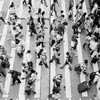
Access Global Survey Data
Shape your research on global issues with access to opinions from every corner of the Earth.
Perceptions of Safety Remain High in Niger
Amid continued violence in parts of the country, significantly fewer Nigeriens say they feel safe walking alone at night in the city or area where they live. Eighty-three percent of Nigeriens felt safe in 2015, compared with 67% in 2017. Despite this decline, perceptions of safety in Niger are currently as high or higher than any other country in the region.
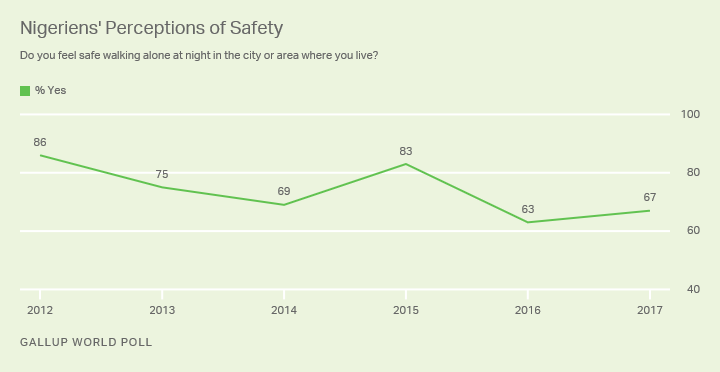
Half of Nigeriens Approve of Issoufou's Job as President
While Nigeriens' confidence in their national government remains high, President Mahamadou Issoufou's approval rating has declined 20 percentage points in the past two years. In 2015, 69% of Nigeriens approved of the way Issoufou was handling his job as president, compared with 49% in April/May 2017.
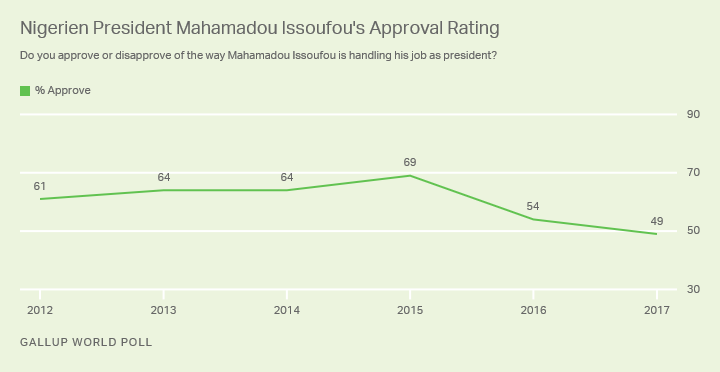
In addition to escalated fighting with extremist groups, the drop in approval ratings also comes in the wake of the controversial presidential election in early 2016. The main opposition candidate was arrested before the election for his role in a human trafficking scandal. The opposition claimed this arrest was politically motivated and alleged fraud in the first round of voting, leading the main coalition to boycott the runoff.
Implications
Niger has been at the center of recent efforts to combat various extremist groups in West Africa. It is a member of the Multinational Joint Task Force against Boko Haram, as well as the United Nations-backed G5 Sahel antiterrorism military force. Niger will likely continue to play a key international role following plans by the U.S. to increase its antiterrorism focus in the region in light of the recent deaths of four American soldiers.
For now, Niger's military response has been accompanied by stable confidence in the institutions carrying out the country's counterinsurgency strategy. However, local dynamics have contributed to a decline in Issoufou's job approval rating. Declining support could lead to an unstable political environment, which could further complicate security initiatives in the region.
Survey Methods
These results are based on face-to-face interviews with 1,000 adults, aged 15 and older, conducted in Niger April 28-May 11, 2017, in French, Hausa and Zarma. For results based on the total sample of national adults, one can say with 95% confidence that the maximum margin of sampling error is ±3.8 percentage points. The margin of error reflects the influence of data weighting. In addition to sampling error, question wording and practical difficulties in conducting surveys can introduce error or bias into the findings of public opinion polls.
For complete methodology and specific survey dates, please review Gallup's Country Data Set details.
Learn more about how the Gallup World Poll works.
